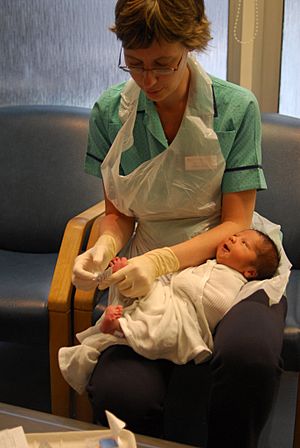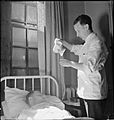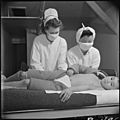Nursing facts for kids

A British nurse caring for a baby
|
|
| Occupation | |
|---|---|
| Names | Nurse |
|
Activity sectors
|
Nursing |
| Description | |
| Competencies | Caring for general well-being of patients |
|
Education required
|
Qualifications in terms of statutory regulations according to national, state, or provincial legislation in each country |
|
Fields of
employment |
|
|
Related jobs
|
|
Nursing is a job in the health care sector. Nurses help people, families, and communities. They help them stay healthy or get better. They also help improve their quality of life.
Nurses are different from other health workers. This is because of how they care for patients. It's also about their special training. And it's about what they are allowed to do. Nurses work in many different areas. Some can even prescribe medicines.
Many nurses follow a doctor's orders. This is how most people see nurses. They are seen as helpers who care for sick people. But some nurses, called nurse practitioners, can work on their own. They can do this in many places. After wars, nurse training became more advanced. Many old rules about nurses are now changing.
Nurses create a plan to care for patients. They work with doctors, therapists, and the patient's family. This plan helps treat illness. It also helps improve a patient's quality of life. In the United States and the United Kingdom, advanced nurses can do more. These include clinical nurse specialists and nurse practitioners. They can find health problems. They can also prescribe medicines and other treatments. This depends on the rules where they work.
Nurses also help organize patient care. They work with other health team members. These include therapists, doctors, and dietitians. Nurses work with doctors. They also work on their own as nursing experts.
Contents
The History of Nursing
Early Healthcare in Greece
Hundreds of years ago in Greece, sick people went to temples. Men and women there helped them. They made medicines from flowers and other plants. In the fifth century BC, about 2400 years ago, a Greek man named Hippocrates was curious. He wanted to know why people got sick. He wrote over 70 books about health. He was one of the first people to study healthcare. That is why he is often called the "father of Western medicine."
Religion and Hospitals
Religion was also important in nursing history. Jesus Christ taught that sick people should be helped. During the Middle Ages, the Christian church opened more hospitals. The Muslim people also opened hospitals. Some were in Baghdad and Damascus. Muslim hospitals helped people from any country or religion.
Images for kids
-
Florence Nightingale helped create modern nursing. She worked during the Crimean War. Nightingale is seen as the first nurse theorist. She said health needs five things: (1) fresh air, (2) clean water, (3) good drainage, (4) cleanliness, and (5) light. If these were missing, people got sick. Nightingale also first defined the role of nursing and nurse education.
-
A recruiting poster for Australian nurses from World War I
See also
 In Spanish: Enfermería para niños
In Spanish: Enfermería para niños







